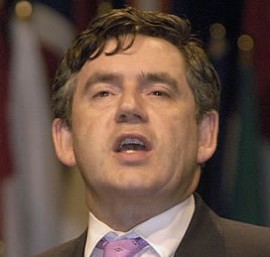
How many times do we hear in British politics that federalism in Europe means centralisation? That a federal Europe would continue to accrete power after power away from the member states? That the costs and bureaucracy would grow and continue to grow if the EU were to be more like a federal system?
But then, suddenly, when it comes to discussing the member states themselves, federalism means that they have smaller central institutions, not larger ones.
In the House of Commons yesterday, Conservative leader David Cameron’s claim that other countries had smaller parliaments and fewer MPs was dismissed by Gordon Brown as being because they had federal systems of government. This is what was said at Prime Minister’s Questions:
Mr. Cameron: The House of Commons has 646 MPs. We have one of the largest lower Houses in the western world—larger than in Spain, France, Germany and Italy. In fact, if we take the Lords and Commons together, we have more political representatives than any country other than China. Should we not reduce the cost of politics by asking the next Boundary Commission to reduce the size of the House of Commons?
The Prime Minister: Many of the countries that the right hon. Gentleman is talking about are federal systems that have not only central Parliaments but federal Parliaments. I do not know whether he is proposing that we make an instant judgment now to reduce the number of MPs by 50, 100 or 150. Those are matters that have to go before an independent commission and people have to look at the boundaries. On all these issues, I am trying to build a political consensus on change. I am trying to build a consensus across all— [Interruption.]
Mr. Speaker: Order. The Prime Minister must be heard as well.
The Prime Minister: I am trying to build a political consensus on change. It is unfortunate that we cannot today highlight those issues on which we agree that action needs to be taken immediately. That is the way forward for this House to restore trust in its affairs. We have got to deal immediately with the issues ahead of us. We have got to take the extreme action that I propose—I hope the right hon. Gentleman will be able to support it—and, at the same time, we have got to reform the expenses system. I think that today is a time for us all to come together to make the changes that are necessary.
Mr. Cameron: I must say to the Prime Minister that Spain and France are not federal systems, and they have much smaller Parliaments than we do.
If the normal British understanding of federalism as the centralising conveyor belt were correct, federal systems ought to have larger parliaments, not smaller ones. Perhaps that normal British understanding is mistaken.
